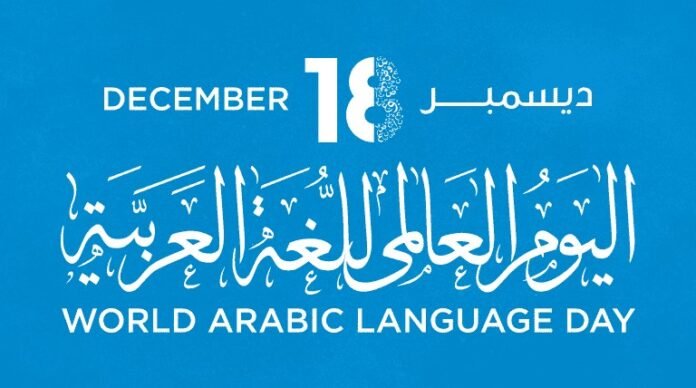The Significance of Arabic Language Day
Arabic Language Day, celebrated annually on December 18, serves as a platform to highlight the rich historical and cultural significance of the Arabic language. Established by the United Nations Educational, Scientific and Cultural Organization (UNESCO) in 1973, this day aims to promote the use and appreciation of Arabic, a language spoken by over 450 million individuals across the World. With its deep roots in history, Arabic is a key medium through which vast literary, philosophical, and scientific knowledge has been communicated throughout centuries.
The significance of Arabic as a language of science and literature cannot be overstated. It has played a pivotal role in the advancement of various fields, particularly during the Golden Age of Islam, when scholars made groundbreaking contributions in mathematics, astronomy, medicine, and philosophy. The translations of classical texts into Arabic during this period preserved essential works from ancient civilizations, ensuring their survival and influence on future generations. This linguistic richness not only reflects the depth of intellectual thought but also affirms the importance of Arabic in global heritage.
Moreover, Arabic encompasses a wide range of dialects, each carrying unique cultural identities and expressions. This diversity within the language enriches communication and fosters connections among various communities. Celebrating Arabic Language Day draws attention to the nuances and variations of the language, emphasizing the need for inclusivity and understanding among speakers from different regions. Through such recognition, the day encourages both native speakers and learners to engage with Arabic’s diverse expressions, thus preserving its vibrancy for future generations.
In essence, Arabic Language Day champions the heritage of a language that has endured and adapted through time, while serving as a bridge connecting cultures and communities worldwide.
A Gathering of Voices: Speakers and Their Insights
The Vienna commemoration event for Arabic Language Day featured an array of esteemed speakers, each bringing their unique perspectives on the significance of the Arabic language in contemporary society. Notable among them was H.E. Ambassador Salah Boucha, Head of Mission of the League of Arab States – Vienna, who emphasized the role of Arabic as a fundamental pillar of cultural identity and diplomacy. In his speech, he highlighted how Arabic fosters an understanding of the rich and diverse heritage of the Arab world, urging for its continued prominence in global discussions.
Ms. Ghada Waly, Director-General of UNOV and Executive Director of the United Nations Office on Drugs and Crime, a prominent figure in the international arena, also lent her voice to the celebration, articulating the contributions of Arabic to global discourse. She reinforced the idea that the Arabic language is a bridge connecting various cultures and peoples, serving as a tool for dialogue and cooperation. Waly’s insights delved into the challenges faced by the Arabic language in the modern context, advocating for unity as a means to overcome these obstacles while maintaining the linguistic diversity that enriches human civilization.
Throughout the event, speakers reiterated the theme of resilience, demonstrating how the Arabic language has faced and continues to endure various sociopolitical trials. They shared personal anecdotes and professional experiences that illustrated the enduring legacy of Arabic, further enhancing its status as a language of literature, art, and communication. Each contribution reflected a deep admiration for the Arabic language, capturing the atmosphere of respect and solidarity among attendees. As speakers exchanged thoughts, a collective sense of responsibility emerged to promote and preserve Arabic, ensuring that its legacy endures through generations to come.
Cultural Expressions: Poetry and Culinary Delights
The celebration of Arabic Language Day was marked by rich cultural expressions that highlighted the profound connection between language, art, and culinary traditions. A standout feature of the event was a captivating poetry reading by H.E. Salah Abdel Shafi, Ambassador of the State of Palestine. The verses eloquently reflected on the Palestinian Poet Mahmoud Darwish poignant personal experiences while he was in Prison, weaving together themes of identity, heritage, and the unifying power of language. Through powerful imagery and emotive language, the poem resonated with many attendees, evoking a sense of shared history and collective pride in Arabic culture. The poet’s ability to articulate the complexities of personal and communal identity served as a reminder of how cultural narratives shape our understanding of ourselves and one another.
Alongside the poetic expressions, the culinary offerings presented by various Arabic states played an instrumental role in enriching the celebration. Food, often referred to as a universal language, became a means of cultural exchange that transcended linguistic barriers. Each dish, from the Tee drinks of Moroccan to the delicate flavors of Lebanese own drinks production, showcased the diverse gastronomic heritage of the Arab world. Such culinary delights not only tantalized the taste buds but also served as a conduit for storytelling, allowing participants to experience the cultural significance behind each dish.
The enjoyment of traditional drinks and dishes fostered a sense of community among the attendees. Sharing meals is an ancient tradition that brings people together, facilitating connections and understanding. The event’s atmosphere was imbued with joy and togetherness as individuals gathered around tables, engaging in dialogue and celebrating their shared love for Arabic language and culture. This harmonious blend of poetry and culinary artistry illustrated the rich tapestry of cultural expression, leaving a lasting impression on all who attended.
Looking Forward: The Future of Arabic in a Globalized World
The future of the Arabic language in an increasingly globalized world presents an array of challenges and opportunities that require thoughtful consideration and action. As Arabic speakers navigate the complexities of modern communication.
Technology, too, plays a significant role in shaping the future of Arabic. The rapid advancement of communication technologies provides new platforms for Arabic expression, particularly through social media and digital content. While this offers an unprecedented opportunity for the global dissemination of Arabic culture, it is imperative that we remain aware of how these platforms can also distort and simplify the language. Efforts must be made to harness technology to promote authentic Arabic usage, incorporating modern tools that support the learning and practice of the language in its various forms.
To foster a deeper appreciation for Arabic, it is important to advocate for its inclusion in international dialogues and discussions. By highlighting the relevance of Arabic in global issues—from diplomacy to culture—we can contribute to a broader understanding of its significance. Initiatives aimed at increasing Arabic education, both in local communities and globally, can help bridge cultural gaps and enhance mutual respect. Ultimately, embracing the richness of the Arabic language offers a profound insight into global heritage. Each individual has a role to play in this journey, whether through learning, teaching, or simply celebrating the diverse expressions of Arabic culture.
Speakers:
-H.E. Ambassador Salah Boucha, Head of Mission of the League of Arab States – Vienna
– Ms. Ghada Waly, Director-General of UNOV and Executive Director of the United Nations Office on Drugs and Crime
– H.E. Magdi Ahmed Mofadal Elnour, Ambassador of Sudan, Chair of the Council of Arab Ambassadors.
– Mr. Robert Bruce Floyd, Executive Secretary of the Comprehensive Nuclear-Test-Ban Treaty Organisation
– Ms. Margaret Doane, IAEA Deputy Director General and Head of the Department of Management
– Mr. Yuko Yasunaga, Deputy to the Director General and Managing Director of the Directorate of Corporate Services and Operations on behalf of Mr. Gerd Müller, Director General of the United Nations Industrial Development Organisation (UNIDO)
– H.E. Salah Abdel Shafi, Ambassador of the State of Palestine


